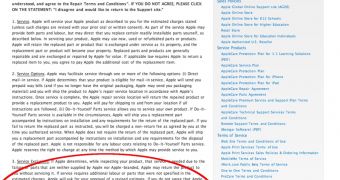While reading Apple’s Repair Terms and Conditions, we noticed the document included such service exclusions as extreme temperature or humidity, static electricity, fire and, believe it or not, “acts of God”. If you happen to stumble across this account in Apple's or other vendors' terms and conditions for repairing an under-warranty device, don’t be baffled by it.
It is well known in legal circles that “Act of God” is a term used to describe events outside of human control, such as sudden floods or other natural disasters, for which no one can be held responsible. But isn’t the “natural disasters” term enough to describe such events?
As any respectable electronics vendor, Apple has its own set of rules set in place for repairing damaged devices. As it goes, even if an Apple product is under warranty, the company can still wash its hands of any liability. And here’s how.
The fourth paragraph (third section) of Apple’s Repair Terms and Conditions, “Service Exclusions,” states the following: “If Apple determines, while inspecting your product, that service is needed due to the failure of parts that are neither supplied by Apple nor Apple-branded, Apple may return the product to you without servicing it. If service requires additional labour or parts that were not specified in the estimated charges, Apple will ask for your approval of a revised estimate. If you do not agree that Apple may revise the estimated charges, Apple will return your product.”
So far so good – it’s not like you can hold the Mac maker responsible for someone else’s sloppy job. But then come the clauses that shift responsibility from Apple to…. well, other entities. Entities that, so far, haven’t exactly been straightforward about their existence (emphasis ours).
“Apple reserves the right to refuse service on products that have serial numbers altered, defaced or removed or that are damaged due to accident, abuse, neglect, misuse (including faulty installation, repair, or maintenance by anyone other than Apple or an Apple Authorized Service Provider), unauthorized modification, extreme environment (including extreme temperature or humidity), extreme physical or electrical stress or interference, fluctuation or surges of electrical power, lightning, static electricity, fire, acts of God or other external causes. In such event, Apple may return the product to you without servicing it.”
Right. Keeping in mind that it is still just a legal term, how do you tell an “act of God” apart from “other external causes?” What are these, and who determines them? And if “acts of God” are not the most far-fetched, then those other external causes could mean… what, the re-spawning of the Universe? We’d better throw this one in alongside natural disasters, just in case we find a gateway to another Cosmos and proceed with reporting the news.
Softpedia would like to clarify it doesn’t find it ridiculous that Apple has included this clause, but rather that legal terminology itself is, sometimes, ridiculous. According to this source, “Acts of God are significant for two reasons: 1) for the havoc and damage they wreak, and 2) because often contracts state that "acts of God" are an excuse for delay or failure to fulfill a commitment or to complete a construction project. Many insurance policies exempt coverage for damage caused by acts of God, which is one time an insurance company gets religion. At times disputes arise as to whether a violent storm or other disaster was an act of God (and therefore exempt from a claim) or a foreseeable natural event. God knows the answer!”

 14 DAY TRIAL //
14 DAY TRIAL //